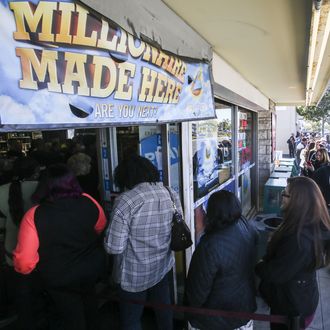
There were no winners of Saturday night’s record-setting $947.8 million Powerball jackpot. That means millions of Americas get to keep dreaming about which sports team or small island nation they could buy through the next drawing on Wednesday, at which point the rolling jackpot will likely reach $1.3 billion (or $806 million, if a single winner took the lump-sum payment). However, as yet another record jackpot will surely mean more record-breaking ticket sales, it’s worth taking a deeper look at what the implications are of this new billion-dollar lottery age.
First off, the reason no one has won yet, despite a level of lottery hysteria that led California to sell $2.8 million worth of tickets an hour on Saturday, is because it’s basically impossible to get the right Powerball number due to the almost incomprehensibly bad odds. According to the Associated Press, it was so hard to win on Saturday that nobody took the prize even after 75 percent of the nearly 300 million possible number combinations had been sold. And this is all exactly what the Iowa-based Multi-State Lottery Association wanted when they worsened the Powerball odds last fall from 1 in 175 million to 1 in 292.2 million. As FiveThirtyEight’s Walt Hickey determined when news of that change first broke, these billion-dollar prizes will likely become commonplace as a result:
Based on a basic model I built that simulates Powerball jackpots over the next five years of play, the odds change makes a huge, huge difference. Under the old (1 in 175,223,510) odds, there was a billion-dollar lottery in only 8.5 percent of the simulated five-year periods. But under the new (1 in 292,201,338) odds, there was a billion-dollar lottery in 63.4 percent of the simulated five-year periods.
And lottery officials are obviously hoping that the bigger prizes lead to more frenzied spending. For some context on that, Americans spent $70 billion on lottery tickets in 2014, which according to CNN was more than they spent on all other forms of leisure and entertainment combined.
Of course, there is a supposed upside of so many people playing a game that is the mathematically worst bet you can legally make, and that is — provided you like government spending — that at least some of all this lottery cash ends up paying for much-needed public programs like education. The problem is that amount is not as much as you might imagine. As NPR’s Camila Domonoske points out, around 27 cents of every dollar spent on lottery tickets goes back to government spending programs of some kind, though as NBC News noted a few years ago, the amount depends on the the state:
The bulk of the money collected from tickets — about 60 cents of every dollar on average — goes back to the winners, said [lottery official David] Gale. After expenses — everything from advertising, fees paid to vendors selling tickets and salaries for lottery commission staff — the amount left over varies widely from state to state.
In Rhode Island, just 11 cents in net profits was returned to the 2012 state budget to support a variety of programs, from education to social services. Oregon’s lottery, the most profitable in the country, generated 50 cents in profits for each dollar of ticket sales last year to help pay for education, economic development and natural resource programs.
There are also the taxes levied on any given prize winner, which, depending on the state, ends up at around 45 percent. But Domonoske emphasizes that while any lottery is basically an elective tax, the cost of administering that tax is way more expensive than traditional government tax programs. More importantly, there is the concern that this de-facto lottery tax is an exceptionally regressive one, since the vast majority of day-to-day lottery spending comes from the nation’s poor. As The Atlantic’s Derek Thompson argued last May, “state lotteries take from the poor to spare the rich, all while marching under the banner of voluntary entertainment”:
The poorest third of households buy half of all lotto tickets, according to a Duke University study in the 1980s, in part because lotteries are advertised most aggressively in poorer neighborhoods. A North Carolina report from NC Policy Watch found that the people living in the poorest counties buy the most tickets. “Out of the 20 counties with poverty rates higher than 20 percent, 18 had lottery sales topping the statewide average of $200 per adult,” the North Carolina Justice Center reported.
Whatever the benefit or cost, the country is likely to double-down on its Powerball mania in the coming days. Just keep in mind that studies have shown that, horror stories aside, winning the lottery doesn’t make people happier, because winners eventually end up returning to their preexisting level of happiness, or unhappiness, after the initial shock wears off. In fact, as John Tierney pointed out in the New York Times a few years ago, the worst part of winning the lottery may be the loss of anonymity and how newfound wealth unsettles family and social circles. The good news? If you become a billionaire on Wednesday, you can set up a trust or company to receive the money on your behalf. The better news? You don’t have to worry about any of it, because, by design, you’re not going to win Wednesday’s Powerball.






























